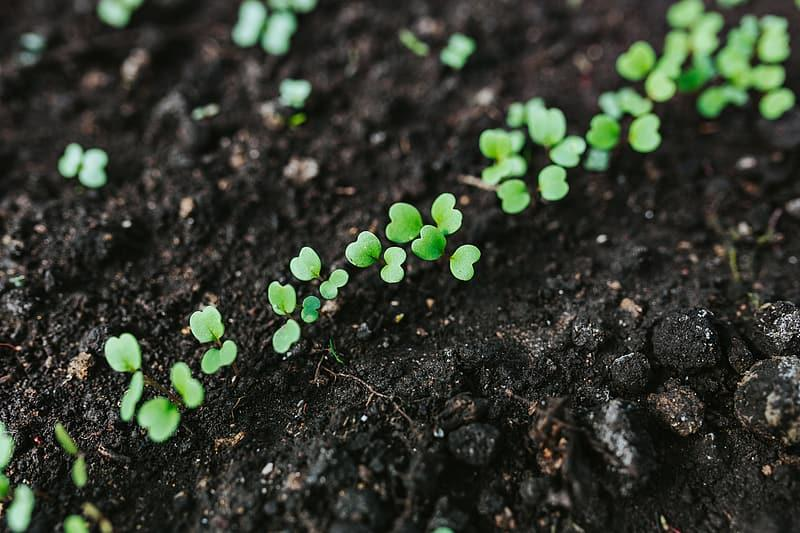
Write two characteristics of black soil.
Answer
569.1k+ views
Hint:
Soil is a layer of unconsolidated material on the surface of the earth, in which the plant is growing. Soils is a mixture of mineral grain from the earth, decomposing organic matter, and air voids. Soil is the earth material which links biosphere and atmosphere, hydrosphere and geosphere.
Complete step by step solution:
Types of soil:
- Alluvial soil
- Black soil
- Red soil
- Laterite soil
- Mountain soil
- Desert soil
Soil formation:
Solid rocks particles are broken down from mechanical weathering.
Chemical weathering releases important nutrients from rock grains.
Seeds are carried onto the soil grains and grow into plants which enrich the soil.
Microorganisms the remains of plants to form humus which further enriches the soil.
The cycle continues until the soil reaches maximum fertility given the climate it is in.
Black soils formed from lava- solidified rocks and is known as black cotton soil. The black colour of black soil is due to its iron content, deriving from plutonic lava materials.

Characteristics of black soil:
- Dark grey to black in colour
- High clay content
- Highly moist retentive
- Develops cracks in summer
- Highly suitable for cotton
- Rich in iron, lime, calcium, magnesium, alumina, carbonates.
Note:
Crops grown in black soil are cotton, sugarcane and tobacco. It is found in the central and northwestern area of the southern plateau. Black soil is known as regur soil. Black soil responds to irrigation. The pH level of the soil is $7.2 - 8.5$ . In India, black soil is spread across Maharashtra, Karnataka and Madhya Pradesh.
Soil is a layer of unconsolidated material on the surface of the earth, in which the plant is growing. Soils is a mixture of mineral grain from the earth, decomposing organic matter, and air voids. Soil is the earth material which links biosphere and atmosphere, hydrosphere and geosphere.
Complete step by step solution:
Types of soil:
- Alluvial soil
- Black soil
- Red soil
- Laterite soil
- Mountain soil
- Desert soil
Soil formation:
Solid rocks particles are broken down from mechanical weathering.
Chemical weathering releases important nutrients from rock grains.
Seeds are carried onto the soil grains and grow into plants which enrich the soil.
Microorganisms the remains of plants to form humus which further enriches the soil.
The cycle continues until the soil reaches maximum fertility given the climate it is in.
Black soils formed from lava- solidified rocks and is known as black cotton soil. The black colour of black soil is due to its iron content, deriving from plutonic lava materials.

Characteristics of black soil:
- Dark grey to black in colour
- High clay content
- Highly moist retentive
- Develops cracks in summer
- Highly suitable for cotton
- Rich in iron, lime, calcium, magnesium, alumina, carbonates.
Note:
Crops grown in black soil are cotton, sugarcane and tobacco. It is found in the central and northwestern area of the southern plateau. Black soil is known as regur soil. Black soil responds to irrigation. The pH level of the soil is $7.2 - 8.5$ . In India, black soil is spread across Maharashtra, Karnataka and Madhya Pradesh.
Recently Updated Pages
Master Class 11 Computer Science: Engaging Questions & Answers for Success

Master Class 11 Business Studies: Engaging Questions & Answers for Success

Master Class 11 Economics: Engaging Questions & Answers for Success

Master Class 11 English: Engaging Questions & Answers for Success

Master Class 11 Maths: Engaging Questions & Answers for Success

Master Class 11 Biology: Engaging Questions & Answers for Success

Trending doubts
One Metric ton is equal to kg A 10000 B 1000 C 100 class 11 physics CBSE

There are 720 permutations of the digits 1 2 3 4 5 class 11 maths CBSE

Discuss the various forms of bacteria class 11 biology CBSE

Draw a diagram of a plant cell and label at least eight class 11 biology CBSE

State the laws of reflection of light

Explain zero factorial class 11 maths CBSE




